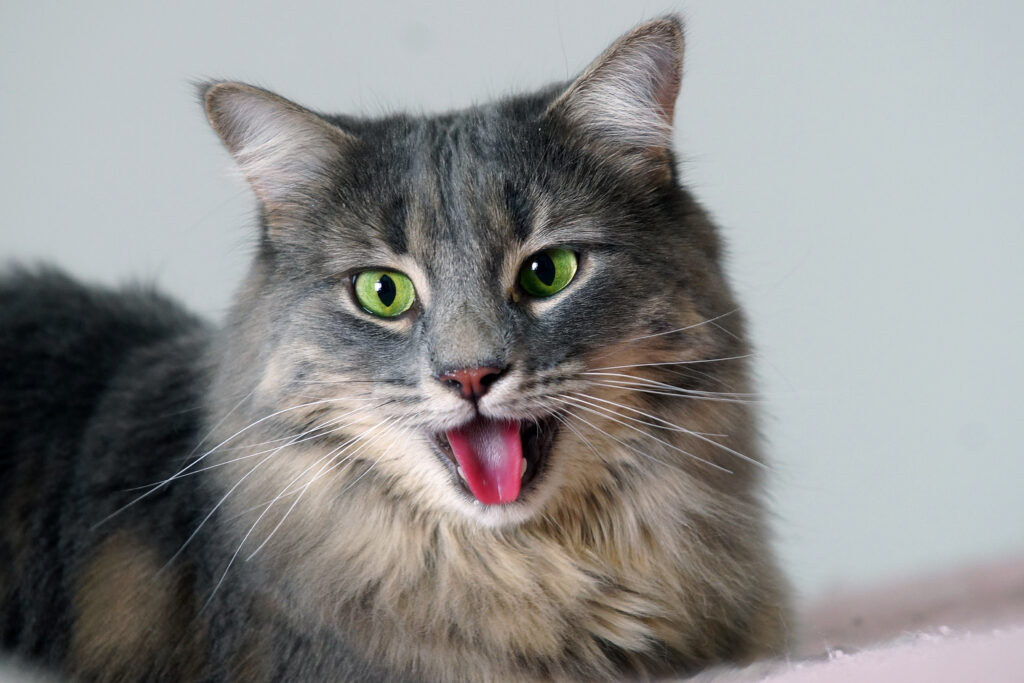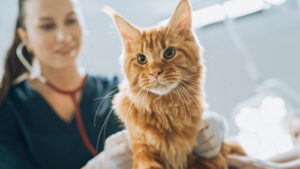Have you ever observed your cat panting and wondered whether it was normal? Unlike dogs, cats don’t typically pant as a cooling mechanism, so it might be an indication of a health concern. At Loveland Regional Animal Hospital in Loveland, OH, your cat’s health is our priority. Here we’ll uncover the reasons behind feline panting and guide you on when to seek veterinary assistance. If you have questions or need to schedule an appointment, give us a call today at (513) 697-9796.
Understanding Cat Panting: Normal or a Sign of Trouble?
While it’s less common for cats to pant compared to dogs, there are situations where panting is considered normal and others where it could be indicative of a health issue. It’s important to understand the distinction:
Normal Panting
Cats may pant briefly in response to strenuous physical activity, high temperatures, or even acute stress. For example, you might notice your cat panting after an energetic play session or during a stressful car ride. This type of panting is usually short-lived and resolves once your cat has calmed down or cooled off.
Panting as a Sign of Trouble
If you observe your cat panting without an apparent reason, such as during periods of rest, or if the panting is persistent, it should be a cause for concern. This is especially true if the panting is accompanied by other symptoms like coughing, wheezing, lethargy, or changes in appetite. In such cases, panting might be a symptom of underlying health issues like respiratory problems, heart disease, or other medical conditions.
It’s critical to monitor the context and duration of your cat’s panting. If the panting seems unusual or is accompanied by other concerning signs, it’s advisable to consult with your veterinarian. The professionals at Loveland Regional Animal Hospital are well-equipped to assess your cat’s symptoms and provide the necessary care.
Exploring Common Causes of Panting in Cats
Panting in cats can be caused by a variety of health issues. Here’s a list of common causes:
- Respiratory Infections: Just like humans, cats can suffer from respiratory infections which can lead to panting. Symptoms may include sneezing, nasal discharge, and fever.
- Heartworm Disease: This serious condition, caused by parasitic worms, can affect a cat’s lungs and heart, leading to panting, coughing, and lethargy.
- Asthma: Feline asthma can cause difficulty in breathing, leading to panting. Look out for wheezing or rapid breathing as signs of this condition.
- Heart Disease: Heart problems can restrict a cat’s ability to circulate oxygen effectively, resulting in panting. Other signs include lethargy and decreased appetite.
- Heatstroke: Overheating in hot weather or due to overexertion can lead to panting. It’s critical to ensure your cat stays cool and hydrated, especially during summer.
- Stress or Anxiety: Similar to humans, cats can pant when they are stressed or anxious. This could be due to a change in environment, loud noises, or other stressors.
- Pain: If your cat is in pain, whether due to injury or an underlying health issue, it may pant as a reaction to the discomfort.
- Overexertion: Just like after a vigorous play session, cats might pant when they’ve exerted themselves too much.
Remember, while some causes of panting are less serious, others require immediate veterinary attention. If you’re unsure about the cause of your cat’s panting, or if it’s accompanied by other concerning symptoms, get in touch with us!
Why Professional Veterinary Care is Vital
Panting can be a subtle yet significant indicator of underlying health issues in cats. At Loveland Regional Animal Hospital, our veterinarians are equipped with the expertise and tools necessary to make a precise assessment of your pet’s respiratory symptoms. We can effectively distinguish between harmless panting and symptoms that warrant concern, identify the underlying cause, and recommend the right treatment. Early professional intervention is key in ensuring the long-term health and comfort of your cat.
If you’re concerned about your cat’s panting, we encourage you to reach out to us at (513) 697-9796. Our compassionate team is ready to assist you in scheduling an appointment and preparing for your visit, ensuring your cat gets the care they need.





